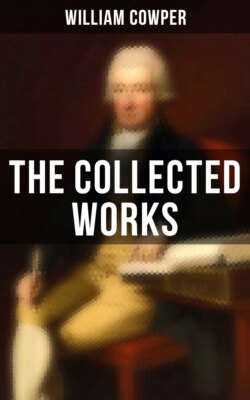Читать книгу The Collected Works - William Cowper - Страница 134
На сайте Литреса книга снята с продажи.
TO THE REV. WILLIAM UNWIN.
ОглавлениеTable of Contents
Olney, June 5, 1781.
My dear Friend—If the old adage be true, that "he gives twice who gives speedily," it is equally true that he who not only uses expedition in giving, but gives more than was asked, gives thrice at least. Such is the style in which Mr. ——confers a favour. He has not only sent me franks to Johnson, but, under another cover, has added six to you. These last, for aught that appears by your letter, he threw in of his own mere bounty. I beg that my share of thanks may not be wanting on this occasion, and that, when you write to him next, you will assure him of the sense I have of the obligation, which is the more flattering, as it includes a proof of his predilection in favour of the poems his franks are destined to enclose. May they not forfeit his good opinion hereafter, nor yours, to whom I hold myself indebted in the first place, and who have equally given me credit for their deservings! Your mother says that, although there are passages in them containing opinions which will not be universally subscribed to, the world will at least allow what my great modesty will not permit me to subjoin. I have the highest opinion of her judgment, and know, by having experienced the soundness of them, that her observations are always worthy of attention and regard. Yet, strange as it may seem, I do not feel the vanity of an author, when she commends me; but I feel something better, a spur to my diligence, and a cordial to my spirits, both together animating me to deserve, at least not to fall short of, her expectations. For I verily believe, if my dulness should earn me the character of a dunce, the censure would affect her more than me; not that I am insensible of the value of a good name, either as a man or an author. Without an ambition to attain it, it is absolutely unattainable under either of those descriptions. But my life having been in many respects a series of mortifications and disappointments, I am become less apprehensive and impressible, perhaps, in some points, than I should otherwise have been; and, though I should be exquisitely sorry to disgrace my friends, could endure my own share of the affliction with a reasonable measure of tranquillity.
These seasonable showers have poured floods upon all the neighbouring parishes, but have passed us by. My garden languishes, and, what is worse, the fields too languish, and the upland-grass is burnt. These discriminations are not fortuitous. But if they are providential, what do they import? I can only answer, as a friend of mine once answered a mathematical question in the schools—"Prorsus nescio." Perhaps it is that men who will not believe what they cannot understand may learn the folly of their conduct, while their very senses are made to witness against them; and themselves, in the course of Providence, become the subjects of a thousand dispensations they cannot explain. But the end is never answered. The lesson is inculcated indeed frequently enough, but nobody learns it. Well. Instruction, vouchsafed in vain, is (I suppose) a debt to be accounted for hereafter. You must understand this to be a soliloquy. I wrote my thoughts without recollecting that I was writing a letter, and to you.
W. C.
